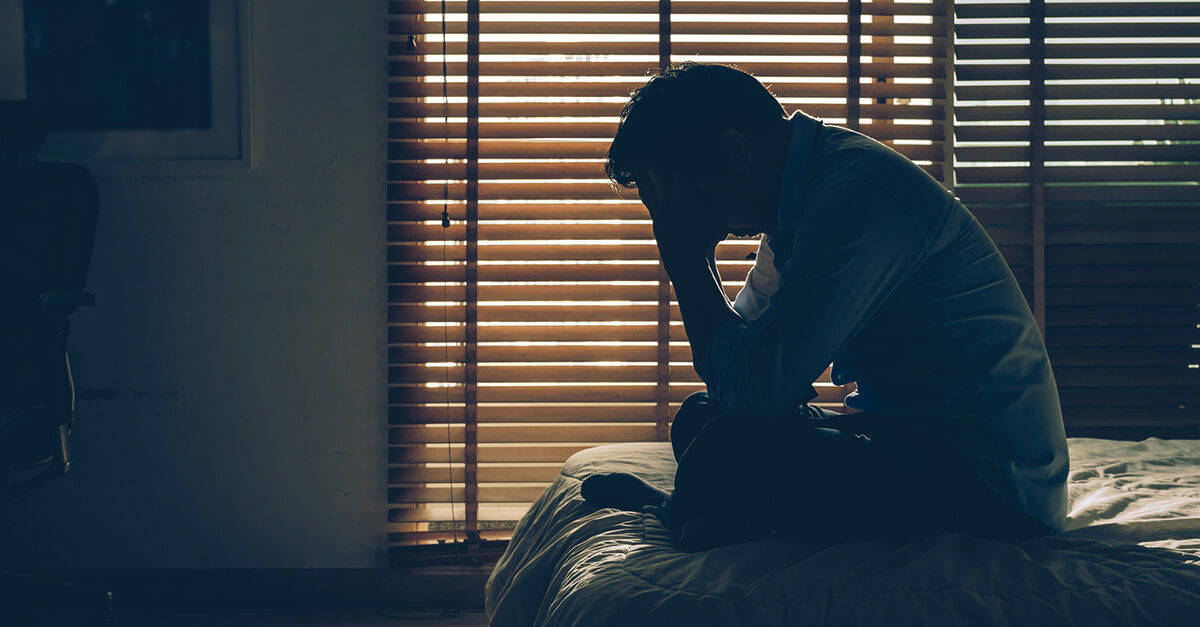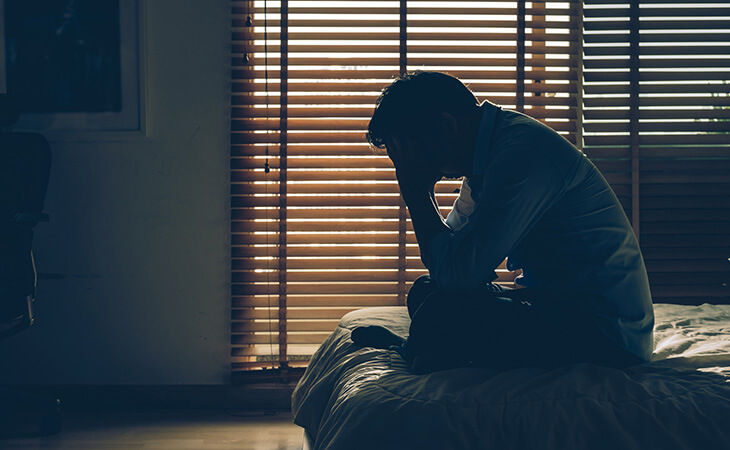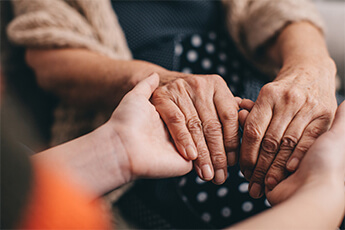What Is depression?


An estimated 1 in 3 people who see their primary care doctors show signs of depression. For many people, the symptoms will improve. But an estimated 1 in 10 people has what’s known as clinical depression or major depressive disorder. The symptoms persist and get worse, negatively affecting the ability to enjoy life. Without treatment, depression can lead to suicide, substance abuse, and other serious problems.
From the community:“Lately (last 6 months or so), I just don’t get as upbeat and happy as I used to be anymore. It’s not that I don’t love my wife or kid anymore (because we have all such a strong bond together). I‘ve just felt very uninspired to do much of anything, felt groggy more often, feeling like a weight is keeping me emotionally down, feeling more and more socially isolated, feeling helpless and irritated at even the most smallest of situations that many would just shrug off, completing menial tasks that feels daunting from time to time, and feel emotionally imprisoned as far as how I feel in general (it seems like all I feel now is nothing, anger, or sadness). I’ve also felt more pessimistic than I have been optimistic too. I’ve wanted to cry at random times with no logical reason behind it. With all that being said, I don’t feel suicidal. I just feel like I’m just stuck everyday, and can’t get out of this major funk I’m in. One of the activities that I would do whenever I had these minor episodes is listen to and play music. Unlike most times, I can hardly feel motivated to play my instruments or feel enthusiastic or upbeat with even my personal favorite songs. Is this depression? Is something else wrong with me? Is there something that I can do to help with this? It’s starting to take its toll both at work and at home, and I don’t know what to do.” – Inspire member
What’s the difference between depression and sadness?
Everyone experiences periods of sadness or has difficult times now and then. But most people are able to cope with their emotions and eventually start to feel better. Depression is different. This mood disorder causes such overwhelming emotions that it becomes nearly impossible to enjoy life. Untreated depression can negatively impact your relationships, social life, work, and physical health.
Depression is one of the most common mental health disorders, affecting as many as 21 million Americans. No one is immune to this disorder. Children as young as two years old have been diagnosed with depression. It affects approximately 3% of children and teens.
What causes depression?
Experts believe that changes or abnormalities in brain chemicals called neurotransmitters make some people more prone to depression. But this isn’t the only cause. Other factors also increase your risk like:
Being a female: Women are twice as likely to experience depression as men, with an estimated 1 in 3 women having a major depressive episode at some point. Teen girls between the ages of 14 and 18 have a much higher risk of depression than their male peers. Hormonal changes during menstruation, pregnancy (and the postpartum period), and menopause may contribute to this increased risk.
Family history: Approximately 40% of people who develop depression have a first-degree relative like a parent or sibling who also has it. You’re also more likely to develop depression if a close family member has bipolar disorder, which causes both depression and mania.
Health conditions and treatments: People with chronic health conditions like cancer, heart disease, or lupus are more prone to depression. In addition, depression can be a side effect of certain medications and treatments.
Life challenges: Difficult life events like the loss of a loved one, divorce, job loss, or other trauma can make you depressed.
Mental health disorders: Having schizophrenia, an anxiety disorder, or substance use disorder makes you more prone to depression.
What are the types of depression?
The different types of depression include:
Clinical depression (major depressive disorder) occurs when you have depressive symptoms almost every day for at least two weeks.
Persistent depressive disorder occurs when daily depressive symptoms last for at least two years. Symptoms often begin during adolescence, but may not be as severe as clinical depression.
Postpartum depression develops during pregnancy or after childbirth. It affects approximately 1 in 7 new moms. You may question your ability to care for your newborn, or feel angry, irritable, or anxious. These symptoms last from two weeks up to one year.
Premenstrual dysphoric disorder (PMDD) causes extreme depression, irritability, and anxiety, in addition to premenstrual syndrome (PMS) symptoms like bloating and breast tenderness, during the weeks before menstruation. Fluctuating hormone levels cause these sudden changes in moods that improve after menstruation starts. As many as 1 in 10 menstruating women experience PMDD.
Seasonal affective disorder(SAD) causes symptoms like sadness, lack of energy, oversleeping, overeating, and trouble concentrating during the fall and winter seasons when there’s less sunshine. Women are more prone to SAD, which affects about 5% of Americans. Symptoms may last for up to 5 months and improve when the sunshine returns.
What are the signs of depression?
Symptoms of depression can vary depending on the type and the affected individual. In general, someone with depression may feel:
hopeless, worthless, or sad
indecisive or confused
irritable, frustrated, or anxious
not hungry or too hungry
overly tired, sleepy, and sluggish
physically ill with headaches, stomach aches, or other pains
withdrawn and uninterested in activities and socializing
From the community:“So, I decided to visit my doctor today to discuss everything since my husband was so worried about my habits the last few months. I obsess about my weight and have gained 35 pounds in the last 6 months, blaming myself for everyone elses problems, etc... We talked for probably an hour and she said she believes I have postpartum depression. I had it after my first child but it did not last this long or seem as severe. I am just looking for some help and support til i get through this. She told me that if we can just stop me from feeling so down she is sure i will lose weight. I am comforting myself with food. I stress eat. Then too often I scold myself for not being in control. I know that these things can be ok but not to the extreme i am going, it's bad. Today I start a new leaf, now that we now what is going on and what steps to take. I can use all the support I can get…”– Inspire member
How is depression diagnosed?
For a diagnosis, you may first see your primary care doctor to determine whether a health condition like a thyroid disorder or a medication is contributing to your low mood. If your doctor can’t determine a cause, they may diagnose you with depression or refer you to a mental health professional like a psychiatrist, psychologist, or licensed clinical social worker.
Psychiatrists are medical doctors who specialize in mental health disorders. To make a depression diagnosis, these doctors refer to criteria established in the latest American Psychiatric Association’s Diagnostic and Statistical Manual of Mental Disorders, the DSM-5-TR.
From the community: “…With S.A.D., you HAVE to have sunshine to fight off the blues. That means getting to like the snow.... I walk, I run, I cross country ski, take the dogs to the dog park. I invested in a couple of pairs of Yak Trax (ice grips that go onto your shoes for about $20 a pair) so I don't have to worry about slipping. The only time I don't get outside is when it's extremely icy, and that's when I do my workouts in my basement gym. And so you know, moonlight helps too. And I like to take my vacations in the south during the S.A.D. peak (March to April).Two years ago, I didn't get outdoors that winter. The depression slowly slid in. I actually had scheduled an appointment with the doctor. I hurt, I had no energy, was tired all the time, couldn't focus. Three days before the appointment, it got nice here and I started mountain biking again. I went in to the doctor's and said that I HAD all these symptoms to tell her about, but they were gone the day I went in... she said, yep - your seasonal affective disorder again. Since then, I get outdoors just about every day.... and it hasn't been back since.” – Inspire member
How is depression treated?
Treatments depend on the type of depressive disorder. They may include:
antidepressant medications
talk therapy (psychotherapy)
brain stimulation therapy like electroconvulsive therapy or vagus nerve stimulation
hormone therapy for PMDD
light therapy (phototherapy) for SAD
What’s the prognosis for someone with depression?
Certain types of depression, like postpartum depression, PMDD, and SAD, are temporary or episodic. With proper treatment, the depression improves and may go away for good. Clinical depression and persistent depressive disorder are chronic conditions that can last for years or a lifetime.
Treatments like antidepressants and psychotherapy are key to improving symptoms and helping you enjoy life again. Treatments also reduce your risk of suicidal thoughts, substance abuse, and other problems associated with depression.
Sources
About DSM-5. American Psychiatric Association.
What is depression? American Psychiatric Association. October 2020.
Mood disorders. Cleveland Clinic. July 2018.
Postpartum depression. Cleveland Clinic. April 2022.
Premenstrual dysphoric disorder. Cleveland Clinic. November 2020.
Seasonal depression (seasonal affective disorder). Cleveland Clinic. April 2022.
Mood disorders. Johns Hopkins Medicine.
Depression. Mental Health America.
Depression in women. Mental Health America.
Mood disorders. Mental Health America.
Depression. Merck Manual. August 2021.
Overview of mood disorders. Merck Manual. March 2020.
Depression. National Alliance on Mental Illness. August 2017.
Seasonal affective disorder. National Institute on Mental Health.
Depression in children and teens. Yale Medicine.
Disclaimer
Member comments are lightly edited for length and to remove identifying information but are otherwise reproduced as they appear in the community as part of public posts.
This content is for general informational purposes only and does not necessarily reflect the views and opinions of any organization or individual. The content should not be used as a substitute for professional medical advice, diagnosis, or treatment. Please consult your healthcare provider about any questions you may have regarding a medical condition.




